Topics That Make People Uncomfortable: Police Brutality and Race in America
Protestors set fire to a car in Milwaukee, WI:
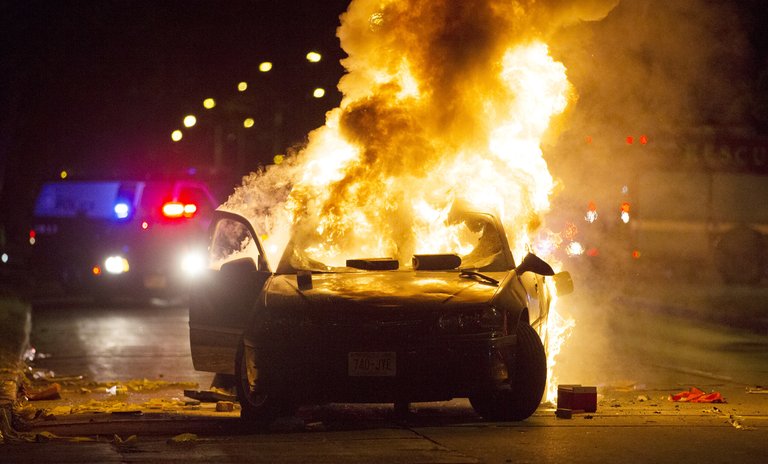
8/14/2016
Regardless of whether people want to have honest discussions about difficult and polarizing topics, the conversations must be had and it’s in everyone’s best interest to try and look at all sides in an attempt to see where people are coming from. It’s important to take emotion out of the equation, which is a difficult thing to do but a necessity if any real understanding is to take place. In this first post I am going to speak to something that has been an ongoing issue.
Yesterday, an armed man in Milwaukee, WI was shot dead by police sparking riots and violence last night after the man, originally pulled over by police in a traffic stop, fled on foot. The man was armed with a stolen semiautomatic handgun that was reportedly taken during a burglary in March. In an unrelated incident Patrolman Tim Smith, a 31-year-old officer in Georgia was shot yesterday after leaving his cruiser to investigate a reported suspicious individual who open fired on him then fled the scene. Another law enforcement official, Jose Chavez, a 33-year-old officer in New Mexico was also killed yesterday during a routine traffic stop when two assailants open fired on him.
This post isn’t designed to get likes. It’s not designed to upset anyone. This post is designed to address an issue with concern, integrity, and unflattering honesty. It’s a desperate plea to members of the African American community, the law enforcement community, politicians, activists, community organizers, and regular citizens of the US and the world at large. Those who wish to continue reading this piece (and I hope all of you do), please make every effort to not get defensive or upset and to simply consider what’s being said and take an honest look in the mirror and ask whether what you’ve been doing is helping move the pendulum forward on this issue or not.
One of the founders of the #BlackLivesMatter movement,
Alicia Garza poses alongside fellow activists.
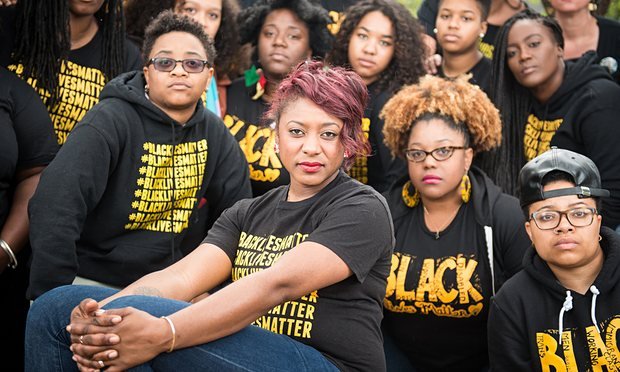
Let me start by saying that Black Lives Matter. As an Irish-Italian male, it's not a matter of feeling uncomfortable discussing the topic although after reading a few Huffington Post articles, it appears there are many white people that feel differently. In any situation, I try to understand all sides the best I can, and I make efforts to put myself in other people's shoes each day. Whether it's going out and speaking with people in Dorchester about education and ways to help make their community better or offering professional development to schools across all demographics to help train teachers in classroom learning strategies that appeal to the way the brain learns best, I am always trying to learn more, understand the world and people better, and help move communities forward.
While any normal human being naturally feels empathy for those born into poverty and low-income or disadvantaged areas, allowing a narrative to develop that explains poverty or incarceration as a result of discrimination is counterintuitive. It sends the message that it’s not your fault, the system is rigged against you (even if it may be), and it precipitates a sort of victim mentality. Of course it’s not the fault of children born into impoverished areas that they are where they are and it’s difficult to argue against racial discrimination in many law enforcement precincts across the country. But as children grow into teenagers and adults, they’re shaped by the experiences and environment around them in addition to the role models in their lives. Institutional racism exists, but it’s not as simple as that. Furthermore, it is unproductive to place blame on only external factors such as racism or prejudice that contribute to one’s plight. All one can really control is their own actions, their own thoughts, and the impact they have on those that they come into contact with throughout their daily lives.
Officers take cover after a gunman in Dallas opens fire
on protestors and police in July 2016.
Army veteran Micah Xavier Johnson, 25, was killed by Dallas
police after killing five officers during a Black Lives Matter protest
march, reportedly telling authorities that he was upset about the
police shootings of two black men earlier this week and wanted
to exterminate whites, "especially white officers."
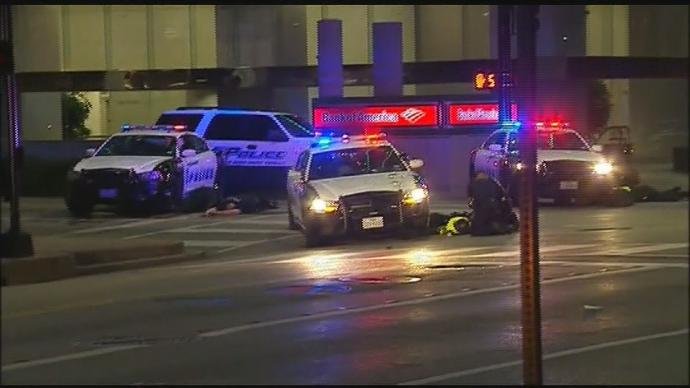
As a person who has had a few encounters with police, I have been treated with excessive force on more than one occasion. Police brutality is unacceptable and the overall attitude of law enforcement needs to evolve. There needs to be accountability and reform. Incidents like the one depicted below are inexcusable as are many of the shooting deaths of citizens. Law enforcement should take steps to avoid escalating incidents and there are programs being put in place to address this issue. But let's not forget that most shootings involving law enforcement are justified and in the vast majority of incidents, police were fired upon first. Don't let the click bait and emotionally jarring images and videos you might see sway you too far from reality.
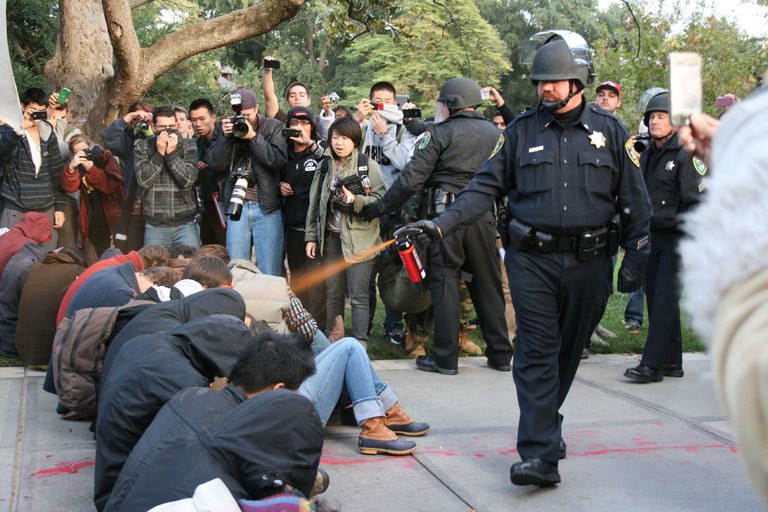
With that said, the very nature of law enforcement requires a certain amount of force and approach in order to be effective. Police Officers across the country, 12% of whom are African American according to Bureau of Justice Statistics, interact with people who break the law every day and there’s no way to know whether the next person is going to react violently to you doing your job, and many often do react with hostility or violence. However you look at it, being a police officer is a difficult and often times thankless job. These men and women put their lives on the line every day to police the community and that’s commendable.
So how do we stop the senseless killing that continues across the country? First let’s start with those who are killed by police. While obvious suggestions like don’t carry loaded weapons (especially stolen weapons), don’t threaten police officers, or assault them seem obvious, if more people abided by these seemingly easy guidelines, then we would still have Michael Brown, Alton Sterling, and many others alive today. And let’s be clear – those men assaulted police and resisted arrest. To deny those facts is to live in a fictional world. Yes, the videos are graphic and the natural reaction is a call to action, to hold those responsible accountable, but that’s why there is a legal system. Although it is imperfect in many ways, it’s the best system we have. It is better than going around targeting police officers in ambush style shooting sprees. Aside from the obvious reasons not to do this like it’s illegal, it’s immoral and it’s cold-blooded murder there are other reasons not to do this.
African Americans kill 45% of all law enforcement officials that are killed in the line of duty (more on this later). Using the published data provided by the FBI, it is not unreasonable for police officers to consider African Americans a threat given that roughly one out of every two times an officer is killed the offender is an African American male, part of a demographic who comprises only 6% of the total US population. With police shootings on both sides on the rise this year, what good will come out of targeting police officers at an increased rate considering the already drastically disproportionate rate at which African American males have killed law enforcement officials over the last few decades? Is there really anyone out there who thinks more violence will solve the problem?
Over the last few years, there has been a drastic increase in the number of videos depicting young African American males, sometimes unarmed, being shot by law enforcement due to the widespread use of camera phones that capture such incidents. While there is historically little reliable data to track law enforcement shootings over the last few decades, the widespread viral nature of these videos is having a profound effect. The use of these devices for such a purpose can be a good thing because it begets accountability and should help facilitate real discussion in regard to the topic of police brutality and excessive force. The challenge is to not let the graphic nature of the videos skew or alter the facts surrounding the events as these videos often pick up half way through a series of events and only tell part of the story.
Viewing any violent video, especially where someone is shot, evokes anger, rage, repulsion, and many other emotions, but once again it’s important to take emotion out of the equation and assess the facts of each scenario. In Baton Rouge, Alton Sterling was resisting arrest and reaching for a gun in his right pocket after a caller had reported a man selling CDs outside a convenience store threatening him with a gun (an offense Sterling had already been arrested and served time for). Michael Brown also assaulted an officer after robbing a convenience store. There's also numerous eyewitness interviews that all have a fairly common through line but discrepancies remain in many of the details. What's clear is that Brown reached into the officer's window and instigated an altercation. That is acceptable behavior under no circumstance.
The use of force is a last resort, but we can't turn a blind eye to the fact that these men were blatantly breaking the law and refusing to cooperate with police. It's unfortunate and tragic that in many cases the officers aren't able to subdue suspects without using their guns, but if you are carrying a weapon and refusing to cooperate, that is a decision that may drastically alter your life. If that's me in that position, I am going to do what the officer tells me to.
Should officers perhaps be more conservative in the use of their weapons? Personally I wish they showed more restraint, but that’s easy for me to say as I’m sitting here typing this piece and not wrestling an angry convicted felon to the ground in an attempt to handcuff him after he refused to cooperate. By the way, this convicted felon has a gun and won’t stop reaching for it in his pocket. In any interaction I’ve had with law enforcement, even the ones where excessive force was used, I never thought it would be a good idea to turn around and charge at the police officer screaming at me to get on the ground. In fact I always thought that would a very bad idea. I have never carried around a gun, I never have made an aggressive move towards an officer, and always did what the officer said because I didn’t want to get shot. To me, that seems like common sense. I knew that I didn’t want to find out what might happen if I made any threatening moves towards the officer or refused to listen to their orders. Perhaps there is a lesson to be learned from handling interactions in this way.
In addition to the lack of real discussions in mainstream media of this topic, what is most concerning is the omission of simple facts in this particular circular conversation that's been going on for what seems like forever. According to The Washington Post and as of July 11, 2016 there have been 1,502 people shot and killed by on-duty police officers since January 1, 2015. Of those 1,502 people, 381 were black and 732 were white (382 of another or unknown race). African-Americans comprise 13% of the population and account for 24% of police killings compared to white people who account for 62% of the population yet make up 49% of those killed by police. As the numbers indicate, African-Americans are killed by police at a higher rate – roughly five times higher, but another alarming statistic is the rate at which African Americans kill police officers.
According to www.ucr.fbi.gov, from 2004-2013, there were 511 police officers killed in the line of duty during felonious incidents. Of those 511, 289 of the alleged assailants were white, 243 were black, 9 were Asian/Pacific Islander, 7 were American Indian/Alaska Native, and race was not reported for 17 offenders. All assailants except 13 were male. Adjusting for the 13 women, this means that white males (who account for 38% of the US population as of most recent census data available at http://factfinder.census.gov/faces/tableservices/jsf/pages/productview.xhtml?src=bkmk) carried out 54% of Law Enforcement Officer deaths from 2004-2013 while African American males (only 6.3% of the US population) carried out 45%. That means 6% of the population is responsible for killing just under half of the police officers over years 2004-2013. It would be absurd and against all logic and reason to not consider the fact that nearly half of police officer deaths are attributable to such a small percent of the US population – a mere 6%. This cannot be ignored.
Police Officers Killed 2004-2013 according to www.FBI.gov
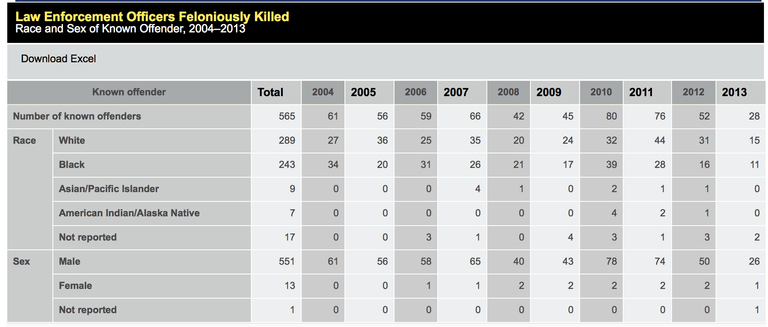
Arguably the most troubling of all realities is the regularity and rate with which African Americans kill one another. Violence in impoverished areas, particularly areas with a high population of African Americans, experience violent crime at an unprecedented rate. Depending on the year, between 48-55% of all murders in the United States are carried out by African-Americans, who as stated earlier account for approximately 13% of the total U.S. population. Another way to say this is that African-Americans, 13% of our nation's population, kill more people in a given year than the rest of the country combined and 90% of that >50% are other African Americans.
In 2013-2014, for the murders where information was available on race, ethnicity, and gender for both victims and offenders, 90% of African-American victims were killed by other African-Americans. The remaining 10% of African-American victims were killed by people within the following demographics: 7.5% white, 0.9% other, and 1.6% unknown. On the other hand, of the 3,005 white people murdered in 2013, 83% were killed by other whites, 13.6% by African Americans, 1.6% other and 1.8 unknown.
2013 Murder statistics according to race from www.FBI.gov
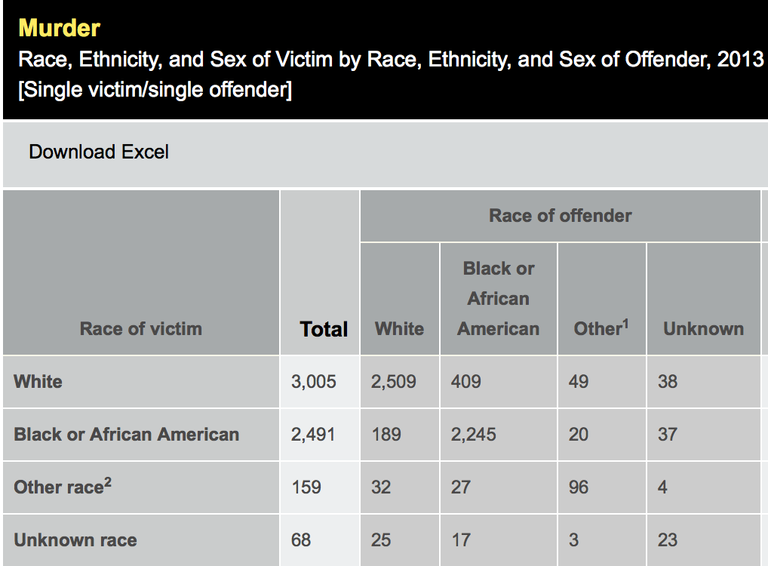
According to https://ucr.fbi.gov/crime-in-the-u.s/2013/crime-in-the-u.s.-2013/tables/table-43 in 2013, African Americans accounted for 52% of all murders, 31% of Rape, 56% of Robbery, 34% of Aggravated Assault, and 30% of Burglary. Whites comparably accounted for 45% of all murders, 66% of Rape, 42% of Robbery, 63% of Aggravated Assault, and 67% of Burglary. The vast majority of these crimes are committed within the communities in which the offenders live. One clear takeaway from this data is that crimes are more often than not committed against people of the same race in the same community. If more violent crime takes place in African American communities, where African Americans are killing one another at steady rate of 5-6 per day, it makes sense that police will be responding to incidents in those neighborhoods more often.
Between 70-80% of local police forces across the country consist of white officers so it makes sense that white officers would account for a majority of police shootings. However, there have recently been some interesting findings in regard to the likelihood of officers to fire their weapons depending on factors such as race and prior discipline of the officers. A study by the National Institute of Justice, using data from the New York City Police Department on 291 officers involved in 106 officer-involved shootings adjudicated between 2004 and 2006, finds that African American officers were 3.3 times and officers rapidly accumulating negative marks in their files were 3.1 times more likely to shoot than other officers. A US Department of Justice study in March 2015 found that in Philadelphia, unarmed whites were shot and killed at a higher percentage than unarmed blacks and furthermore that black and Hispanic officers were more likely to use their weapons in the line of duty.
So if anything is now clear it’s that the realities of policing and racial bias are anything but. The complexity of the issue is daunting. One thing that is clear is that whoever you are, if you truly are concerned with saving black lives (and the cause of 90% of all black murders are other black/African-Americans) the best place to begin is the very communities where approximately 6 African American lives are lost each day at the hands of other African Americans. While peaceful protest is constructive because it brings attention to a cause and allows individuals the right to express their voices and opinions, it is foolhardy to forget why those rights exists and downright reprehensible to use it as an excuse to violate other citizens, officials or property. Burning down gas stations, setting cars on fire, shooting police officers, smashing police cruisers are only hurting the community in which you live. To financially, physically, or in any way compromise business owners, citizens, and other community members whom are all part of whatever population you're a part of, is not only immoral and illegal - it goes against all reason and works against your goals by further enflaming the tensions.
Racial bias exists in all forms and at all levels and institutions throughout our country. It’s impossible to deny. These biases and prejudices affect people across the spectrum differently – some more severe than others. But it’s irresponsible and blatantly false to imply that only white people or white police officers display implicit biases. All people do. And as the attached studies on law enforcement show, all police officers show bias – even the African American and Hispanic ones. Perhaps it’s worth taking a second to think about why that is and whether it’s bias at play or the result of learning from experience and a steady trend in behavior.
To be clear, I am not saying racial bias doesn’t’ exist – it does. And I’m not denying that impoverished communities – in particular African American communities - are in some ways held down by the system, but it serves no use to focus on that as the only reason for the disproportionate amount of African Americans in prison, committing violent crimes, murder, and both getting shot by and shooting police officers. An individual still must choose to carry out those actions and we must not forget that we all have a choice. We have a choice in the thoughts that flow through our head and we have the option to control our impulses. This is not always easy, but it’s an imperative skill that must be developed if one is to live a healthy productive life as a citizen in this country. Pointing fingers will lead to no meaningful progress. At the end of the day, it’s our actions and thoughts that we have control over. Nothing else. Each one of us has the ability to change our thought patterns. If you don’t believe this, Google “Neuroplasticity.”
To sit around blaming one another and deflecting any accountability that we as individuals might be liable for serves to only hold us back. If we are to begin healing, all sides must take responsibility and accountability. If some folks refuse to do that, they are only holding themselves back. For those out there who wish to move forward, you may begin by discussing how you and your community can take action to facilitate improvements among one another. Real change must start at the root. That’s not to say the other issues take a back seat, but given that 13% of the population carries out over half the murders in this country each year, it's more likely than not that when a murder occurs, it was carried out by an African-American. That's not biased, that's what the data says. I 100% agree that black lives matter, just like Hispanic lives, Asian and Asian-American lives, Middle-Eastern lives, white lives, and the lives of all the different types of diverse people throughout our country and the world. If the #blm movement really cares about saving black lives, a good place to start is in the black community, where over 6 African-Americans are murdered at the hands of other African-Americas each day. I care about black lives, and that's why I feel it's important to address the areas where the vast majority of them are continuously lost.
Data tables and sources:
https://ucr.fbi.gov/crime-in-the-u.s/2013/crime-in-the-u.s.-2013/tables/table-43
https://en.wikipedia.org/wiki/List_of_killings_by_law_enforcement_officers_in_the_United_States
http://factfinder.census.gov/faces/tableservices/jsf/pages/productview.xhtml?src=bkmk
https://ucr.fbi.gov/leoka/2013/tables/table_44_leos_fk_race_and_sex_of_known_offender_2004-2013.xls
https://ucr.fbi.gov/leoka/2013/officers-feloniously-killed/felonious_topic_page_-2013
http://amstat.tandfonline.com/doi/abs/10.1080/2330443X.2015.1129918
http://ric-zai-inc.com/Publications/cops-w0753-pub.pdf
http://www.newsweek.com/racial-makeup-police-departments-331130
@foych587 This is a well thought out and well researched article. I disagree with it, but upvoted because I see the effort you put into it and want to encourage more hard research like this.
I've upvoted you and I'm following you now, because you make a compelling argument.
Here is where your article fails.
The rate of violence has nothing to do with skin color and everything to do with poverty levels.
If you look at where these crimes occur and correlate them with income levels you will find a much stronger correlation.
What is happening is that it "looks" like blacks are more violent towards blacks. But the reality is that life is cheap when you live in a ghetto. This is true of any country in the world regardless of it's racial make up.
Those who live in upper income areas are less likely to commit crime regardless of race. Poverty breeds criminality.
That isn't to say that being poor will make you a criminal. It just means that when you have very little to live for, you have very little to lose.
I agree with you about the victimization narrative. I would take that a step further and say that if you're poor and feeling oppressed it's your own fault. A lot of people dig themselves out of that lifestyle every day.
That doesn't mean that those of us who are able to help shouldn't help. But it needs to be a hand up that is earned, because a hand out that is given will just be squandered.
Thanks for your response, Williambanks.
You bring up a very valid and good point, but the fact is that rates of violence do correlate with race. I get into the data here.
Also, totally agree with your quote, “It needs to be a hand up that is earned, because a hand out that is given will just be squandered.”
Disclaimer: I am just a bot trying to be helpful.
Here is what we are doing about the problem in Fairbanks. Consider doing the same in your own communities: http://policeregistry.info/